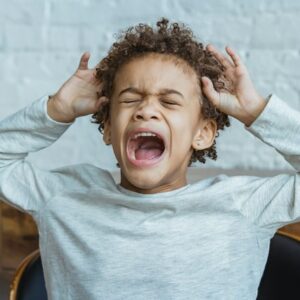
09 Apr Why Emotional Regulation for Kids is Important
Why It’s Important to Teach Emotional Regulation for Kids
Emotional regulation refers to your ability to manage your emotional responses. We may not always be able to control what life throws at us, but we can learn to control how we respond to it. Someone who practices emotional regulation is someone who manages their feelings and reactions rather than be ruled by them. It does not imply that you are ignoring bad emotions or sentiments. You’re merely observing and monitoring your emotions so that you can modify and behave appropriately in different situations. In essence, emotional regulation for kids teaches and allows them to keep their emotional responses in check.
Why Emotional Regulation for Kids Is a Must
Learning to self-regulate is an important milestone in child development, the foundation of which is laid in the early years of life. The ability of a kid to manage their emotional state and emotional reactions has an impact on their family, peers, academic success, long-term mental health, and ability to flourish in a complicated environment. A feeling thermometer is a tool that can be used to measure your kid’s emotional state and intensity of feelings.
Individuals who exercise emotional control have superior coping mechanisms and handle stress better. Emotion management has been shown to protect against depressive symptoms and anxiety disorders. Furthermore, children who can control their emotions are more flexible in their thinking and have higher attention, impulse control, and problem-solving skills. These advantages have a cascading effect, resulting in enhanced confidence, emotional well-being, and general enjoyment.
Here are other reasons as to why emotional regulation for kids is a crucial part of your child’s development.
- It promotes a healthier relationship with family and peers.
A child with poor emotion management skills will often throw tantrums, putting a strain on the parent-child connection. This can have a detrimental effect on one’s home life, including the child’s relationship with his or her siblings, friends, classmates and teachers, and lead to a downward spiral.
Similarly, children who are unable to regulate their strong emotions have poor social skills. They have a more difficult time creating and retaining friends. Inability to self-regulate strong emotions can result in rage, withdrawal, anxiety, or violent conduct.
All of this can lead to more negative consequences: Children who are rejected by their classmates are more likely to drop out of school, engage in delinquency, substance abuse, and engage in antisocial behavior. Likewise, students who are withdrawn and rejected by their peers are more prone to be bullied.
- It improves your child’s performance.
Emotional regulation for kids does not only improve the child’s personal relationships but it is also a powerful predictor of academic accomplishment and success. Effective emotion management enables a student to concentrate on performance throughout tests and examinations rather than being distracted by nervousness.
Students that can self-regulate have higher attention and problem-solving ability, as well as superior performance on tasks involving delayed reward, inhibition, and long-term goals. This impact lasts for the rest of one’s life. Adults who cannot master emotional control have worse work satisfaction, mental health, and overall well-being.
- It promotes resilience and improves mental health.
Children who have learned to manage their emotions are better able to withstand and recover from trauma or adversity: They are more resilient and handle frustration better. Many clinical illnesses in children are directly connected to emotional control or, more specifically, its absence. Emotional dysregulation, for example, has been related to behavioral disorders, such as oppositional defiant disorder, and it can place a kid at a high risk of developing mental health conditions, including anxiety disorders, eating disorders, and clinical depression. This can also mean that a child is predisposed to developing future psychopathology.
How to Teach Emotional Regulation for Kids
Emotional regulation for kids should be an active collaboration between a parent and a child. Explicitly teaching this skill in a straightforward manner helps in developing the necessary skills your child needs to get a better hold of their feelings and reactions.
While emotional regulation is not an inherent skill that children are born with, parents can develop it in a number of ways through responsive parenting, validating your child’s emotions, and modeling behavior. However, teaching emotional regulation for kids may not come easy for some parents and children. That said, here are some strategies and techniques that can help develop and strengthen this crucial life skill.
- Recognize and discuss your child’s feelings with them.
Encourage your child to put what they are feeling into words and describe how it affects them. This helps your child to be more aware of their emotions so that, over time, your kid can process their feelings on their own and calm themselves down without relying on parental supervision.
- Identify what triggers intense emotions in your child.
Help your kid recognize events that cause them to react strongly, and urge them not to avoid such situations. Instead, help and teach them to build appropriate coping strategies when faced with those particular scenarios. Physical activities, for example, is a great outlet for children to release pent-up emotions and divert their attention away from negative thoughts.
- Pay close attention to your child’s needs.
If your kid needs time to process their emotions before talking about them, let them. Allow them to switch their focus to an activity they love. If they ask to be left alone for a while, let them have their space while assuring them that you will be there to listen once they are ready to talk.
- Teach them the importance of mindfulness.
Mindfulness exercises allow an individual to be more connected to his or her own feelings, which enables them to process strong emotions, reduce stress and anxiety, and clear and calm their minds. It’s also believed to have a positive impact on one’s executive functions or self-regulate. For children, practicing mindfulness at an early age helps to promote self-awareness, empathy, calmness and concentration, and emotional regulation.
- Set a good example.
We often hear people say that children are like sponges–what they see and observe from the adults in their lives leave a mark on them. That includes mimicking how their parents behave and speak not only with them but also with other members of the family. In teaching emotional regulation for kids, you, as a parent, must also demonstrate your ability to do stressful or difficult jobs without feeling frustrated.
- Praise positive behavior.
Feedback is incredibly important when teaching a child any skill. When your child responds successfully and properly to an emotionally stressful circumstance, give him or her praise.
- Take advantage of apps and other online resources.
The KidConnect Classroom app (available on iOS), which guides kids in identifying and managing their emotions as they arise. The app features simple tips, activities, and steps that teaches kids how to identify, understand, and manage their emotions and actions.
——————————
Read more blog posts:
- Why Emotional Regulation for Kids is Important
- Effective Strategies for Self-Regulation Mindfulness
- Why You Need to Validate Your Child’s Feelings
——————————
⏩Why Emotional Regulation for Kids Is Important⏪
Want to learn how to teach emotional regulation for kids?
Chat with Themba Tutors Today!
Our learning specialists, academic tutors, and executive functioning coaches are ready to help you right now!
Call: (917) 382-8641, Text: (833) 565-2370
Email: [email protected]
(We respond to email right away!)
Craig Selinger
Latest posts by Craig Selinger (see all)
- Finding The Best Tutor/Learning Specialist For A Student With A Learning Difference - July 14, 2022
- 👉 What to Look for in Your Child’s ADHD Coach 👈 - June 11, 2022
- 👍 8 Effective Ways to Practice Positive Parenting for Teens 👍 - June 9, 2022




No Comments